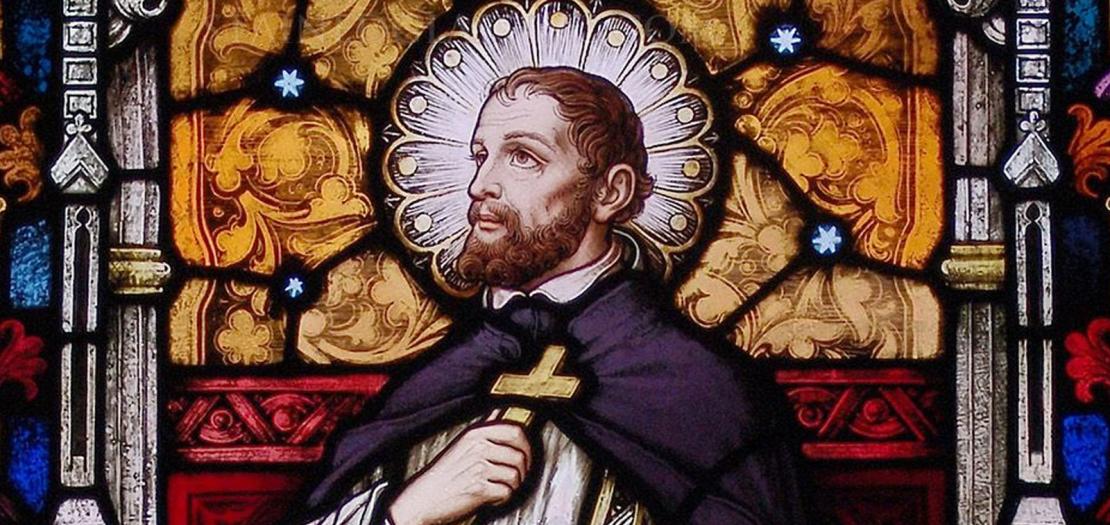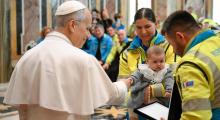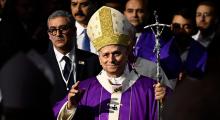Issued by the Catholic Center for Studies and Media - Jordan. Editor-in-chief Fr. Rif'at Bader - موقع أبونا abouna.org

"The love of Christ was the strength that drove him to the furthest frontiers, with constant toil and danger, overcoming setbacks, disappointments and discouragement, indeed, giving him consolation and joy in following and serving him to the end."
With these words, Pope Francis described St. Francis Xavier, "rightly considered the greatest missionary of modern times" at his weekly General Audience on Wednesday morning in St. Peter's Square, as he continued reflecting on figures who personified apostolic zeal.
Reflecting on the patron saint of Catholic missions to the faithful in the Square, the Pope praised the saint's prolific care for the sick, poor, and children, wherever he found himself.
“His intense activity was always united with prayer, with union with God.”
Gratitude to today's missionaries
"We can learn from St. Francis Xavier,' the Pope said, praising him as an example for missionaries and also for young people. With poverty and courage, the Pope said, the saint's "strength was consumed in his service to the mission" and he accomplished incredible endeavours.
While celebrating St. Francis Xavier's achievements, the Pope praised all missionaries, who continue to dedicate themselves to helping others, inspired by the faith and love of Christ.
"We see this courage in missionaries today, who do not go on ships, but on airplanes, but they have the strength to go out," the Pope applauded.
“There are so many hidden missionaries, who even today, do so much more than St. Francis Xavier.”
The Pope praised the "many, many, priests, lay people, sisters, who go to the missions," stressing that we can learn from them.
Dedication unreservedly to God
The Holy Father highlighted how St. Francis Xavier's closeness to Christ, even amid turmoil, always empowered him.
“He never left prayer, because he knew there was strength there.”
Xavier, the Pope recalled, was born into a noble but impoverished family in Navarre, northern Spain, in 1506, who would later study at the University of Paris "in order to obtain a well-paid ecclesiastical position that will secure his future." The Pope recalled his reputation as a likeable and brilliant young man, excelling in sport and study.
In college, he would meet an older "and somewhat special companion," St. Ignatius of Loyola. "They become great friends, and Ignatius helps Francis to live a new and profound spiritual experience," the Jesuit Pope highlighted.
The Pope noted how Francis Xavier would be among the Jesuits of the time sent to the East Indies, to bring the faith.
Making Jesus Christ known
Here, he said, began the first of a numerous band of passionate missionaries, ready to endure immense hardships and dangers, to reach lands and meet peoples of completely unknown cultures and languages.
What they had in common, the Holy Father suggested, is that they were driven only by the very strong desire to make Jesus Christ and His Gospel known.
Later, Xavier was appointed Apostolic Nuncio, Pope Paul III's representative to the rulers of the so-called Indies, and in little more than eleven years, he accomplished an extraordinary work.
Even if ship voyages at that time were very hard and dangerous, with many dying en route from shipwrecks or illnesses, the Pope highlighted, Xavier spent over three and a half years on ships, a third of the entire duration of his mission.
All out of love for God
Having arrived in Goa, India, the capital of the Portuguese Orient, Xavier set up his base there, but did not stop there, the Pope said. Rather, he goes out to evangelise the poor fishermen of India's southern coast, teaching catechism and prayers to children, baptising and healing the sick.
Then, during a night prayer at the tomb of the Apostle St Bartholomew, he feels he must go beyond India, and therefore, leaves for Moluccas, the most distant islands of the Indonesian archipelago, where he founded several Christian communities in two years. The Saint put the Catechism into verse in the local language and taught how to sing it.
The Pope invited faithful to read his letters, to understand better his feelings.
“He writes: 'Dangers and sufferings, accepted voluntarily and solely for the love and service of God our Lord, are treasures rich in great spiritual consolations. Here in a few years one could lose one's eyes from too many tears of joy!" (20 January 1548).”
Great fruits in Asia
One day, in India, the Pope continued, Francis Xavier met a Japanese man, who told him about his distant country, where no European missionary had ever gone before, and decided to travel there after enduring an adventurous journey. "The three years in Japan are very hard, due to the climate, opposition and ignorance of the language," the Pope said, "but even here the seeds planted will bear great fruit."
In Japan, the Pope pointed out, "Xavier understands that the decisive country for the mission in Asia was another: China."
"With its culture, its history, its greatness," the Pope said, "it exercised de facto dominance over that part of the world."
Faced with failure
For this reason, Xavier returned to Goa, and shortly afterwards embarked again, hoping to enter China, even though it was closed to foreigners; however, he did not succeed.
Xavier died at age 46 in 1552, in total abandonment to the Lord, on the small island of Sancian, waiting in vain to land on the mainland near Canton. "Thus ends the earthly journey of Francis Xavier," the Pope said.
Joy of evanglising
Pope Francis concluded by praising St Francis Xavier's exemplary prayer life, and closeness to Christ, until the very end.
"Look at Francis Xavier, look at the horizon of the world, look at peoples in such need, look at so many people suffering, so many people in need of Jesus. And go, have courage. Even today there are courageous young people. I think of so many missionaries for example in Papua New Guinea, I think of friends of mine, young people. I think of all those who have gone to evangelise in the line of Francis Xavier. May the Lord give us all the joy of evangelising, the joy!"







